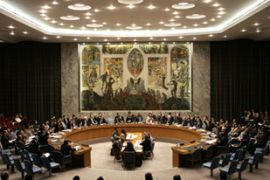EU sanctions target Iran bank
New measures include asset freeze of the country’s biggest bank.

Tehran, which has had a number of UN sanctions imposed against it since 2006, insists it wants atomic energy only for a growing population whose fossil fuels will eventually run out.
Blacklisted bank
The Bank Melli is suspected of providing services to Iran’s nuclear and
ballistic missile programmes and, in a similar move, was blacklisted by the
US last year.
The 27-nation EU is also studying sanctions against Iran’s oil and gas sector, but such a step would probably take several months to implement, diplomats say.
Saeed Laylaz, an independent analyst in Tehran, said the freezing of Bank Melli’s assets would lead to the Iranian economy becoming more isolated and more dependent on Chinese products.
But he suggested Mahmoud Ahmadinejad, the president, might stand to benefit.
Targeting Iran “drives inflation up”, Laylaz said, “but it helps Ahmadinejad’s government hide its failures behind the sanction”.
Incentives offered
Washington has been waiting for Europe to take such measures on Iran for months and the issue was a key one on a recent European tour by George Bush, the US president.
EU member states have been working on the detail since May but the measures were delayed until after a trip to Iran earlier this month by Javier Solana, the EU foreign policy chief.
Solana visited Tehran on June 14 to present a co-operation offer to Iran on behalf of the six major countries involved in the dossier – Britain, China, France, Germany, Russia and the US.
Solana offer
The proposal, which offers Iran technological incentives in exchange for it suspending the sensitive process of uranium enrichment, has been made public, as has a letter from the six world powers dealing with the nuclear crisis.
That offer, a key part of the international community’s carrot-and-stick approach to the issue, was a slightly different version of a package put forward, but rejected, in June 2006.
Solana said on Friday that he had still received no response from the Iranian side on the offer, which is conditional on Tehran suspending its uranium enrichment activities.